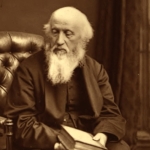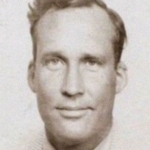Come, little infant, love me now,
While thine unsuspected years
Clear thine agèd father’s brow
From cold jealousy and fears.
Pretty, surely, ’twere to see
By young love old time beguiled,
While our sportings are as free
As the nurse’s with the child.
Common beauties stay fifteen;
Such as yours should swifter move,
Whose fair blossoms are too green
Yet for lust, but not for love.
Love as much the snowy lamb,
Or the wanton kid, does prize,
As the lusty bull or ram,
For his morning sacrifice.
Now then love me: time may take
Thee before thy time away:
Of this need we’ll virtue make,
And learn love before we may.
So we win of doubtful fate;
And if good she to us meant,
We that good shall antedate,
Or, if ill, that ill prevent.
Thus as kingdoms, frustrating
Other titles to their crown,
In the cradle crown their king,
So all foreign claims to drown,
So, to make all rivals vain,
Now I crown thee with my love:
Crown me with thy love again,
And we both shall monarchs prove.





















Comment form: